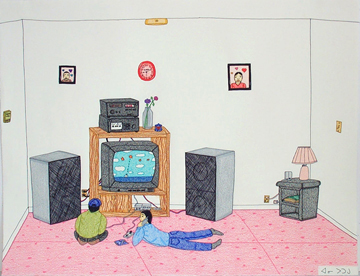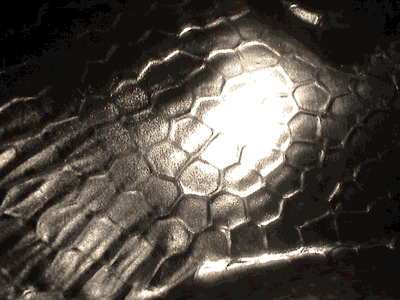
|
Lorna Mills and Sally McKay
Digital Media Tree this blog's archive OVVLvverk Lorna Mills: Artworks / Persona Volare / contact Sally McKay: GIFS / cv and contact |
View current page
...more recent posts

Annie Pootoogook, Saturday Afternoon, 51 x 66 cm, pentel, coloured pencil.
Image taken from Dorset Fine Arts.
Yay! for Annie Pootoogook. She just won the Sobey's Art Award, which makes me happy.
In a recent post I linked to the Wired article about atheism. Here are some more recent tidbits on the themes of science, religion, and neurology.
Philosopher of consciousness and self-proclaimed atheist Daniel C. Dennett had heart surgery and made it through okay.
What, though, do I say to those of my religious friends (and yes, I have quite a few religious friends) who have had the courage and honesty to tell me that they have been praying for me? I have gladly forgiven them, for there are few circumstances more frustrating than not being able to help a loved one in any more direct way. I confess to regretting that I could not pray (sincerely) for my friends and family in time of need, so I appreciate the urge, however clearly I recognize its futility. I translate my religious friends' remarks readily enough into one version or another of what my fellow brights have been telling me: "I've been thinking about you, and wishing with all my heart [another ineffective but irresistible self-indulgence] that you come through this OK." The fact that these dear friends have been thinking of me in this way, and have taken an effort to let me know, is in itself, without any need for a supernatural supplement, a wonderful tonic. These messages from my family and from friends around the world have been literally heart-warming in my case, and I am grateful for the boost in morale (to truly manic heights, I fear!) that it has produced in me. But I am not joking when I say that I have had to forgive my friends who said that they were praying for me. I have resisted the temptation to respond "Thanks, I appreciate it, but did you also sacrifice a goat?" I feel about this the same way I would feel if one of them said "I just paid a voodoo doctor to cast a spell for your health." What a gullible waste of money that could have been spent on more important projects! Don't expect me to be grateful, or even indifferent. I do appreciate the affection and generosity of spirit that motivated you, but wish you had found a more reasonable way of expressing it.Moral philosopher Mary Midgley goes after evolutionary biologist Richard Dawkins again, this time in a review of his recent book The God Delusion for New Scientist (subscription required for full article).
It seems not to have struck Dawkins that academic science is only a small, specialised, dependent part of what anybody knows. Most human knowledge is tacit knowledge - habitual assumptions, constantly updated and checked by experience, but far too general and informal ever to be fully tested. We assume, for instance, that nature will go on being regular, that other people are conscious and that their testimony can generally be trusted. Without such assumptions neither science nor any other study could ever get off the ground, and nor could everyday life.Apparently, Richard Dawkins has a posse.
When we build on these foundations we necessarily use imaginative structures - powerful ideas which can be called myths, which are not lies, but graphic thought-patterns that shape and guide our thinking. This is not irrational: the process of using these structures is a necessary preparation for reasoning. Thus the selfish gene is a powerful idea, so are the Science-Religion war, Gaia, natural selection, progress, and the hidden hand of the market.
Nick Wade reviews evolutionary psychologist and biololgist Marc D. Hauser's new book for the New York Times.
Marc D. Hauser, a Harvard biologist, has built on this idea to propose that people are born with a moral grammar wired into their neural circuits by evolution. In a new book, “Moral Minds” (HarperCollins 2006), he argues that the grammar generates instant moral judgments which, in part because of the quick decisions that must be made in life-or-death situations, are inaccessible to the conscious mind.Helen Phillips reports on the neurological phenonmenon of confabulation in New Scientist (subscription required for full article).
People are generally unaware of this process because the mind is adept at coming up with plausible rationalizations for why it arrived at a decision generated subconsciously.
Dr. Hauser presents his argument as a hypothesis to be proved, not as an established fact. But it is an idea that he roots in solid ground, including his own and others’ work with primates and in empirical results derived by moral philosophers.
The proposal, if true, would have far-reaching consequences. It implies that parents and teachers are not teaching children the rules of correct behavior from scratch but are, at best, giving shape to an innate behavior. And it suggests that religions are not the source of moral codes but, rather, social enforcers of instinctive moral behavior.
There is certainly plenty of evidence that much of what we do is the result of unconscious brain processing, and that our consciousness seems to be interpreting what has happened, rather than driving it. For example, experiments in 1985 by Benjamin Libet of the University of California in San Francisco suggested that a signal to move a finger appears in the brain several hundred milliseconds before someone consciously decides to move that finger. The idea that we have conscious free will may be an illusion, at least some of the time.
Even when we think we are making rational choices and decisions, this may be illusory too. The intriguing possibility is that we simply do not have access to all of the unconscious information on which we base our decisions, so we create fictions upon which to rationalise them, says Kringelbach. That may well be a good thing, he adds. If we were aware of how we made every choice we would never get anything done - we cannot hold that much information in our consciousness. Wilson backs up this idea with some numbers: he says our senses may take in more than 11 million pieces of information each second, whereas even the most liberal estimates suggest that we are conscious of just 40 of these.
Nevertheless it is an unsettling thought that perhaps all our conscious mind ever does is dream up stories in an attempt to make sense of our world. "The possibility is left open that in the most extreme case all of the people may confabulate all of the time," says Hall.
 | Thicket 1: The Voyage is a collaboration between myself and Von Bark, (with protagonists constructed by Jean McKay); a sci-fi narrative depicting space-time adventures in the brain of the animal spaceship. Do you feel empathy for the Kitty-Cat Captain? |
| The installation opens at York Quay Centre on Friday, November 10th, 6-9 pm and closes on Sunday, December 31st. (Join us in the early evening and get warmed up for TAAFI, there's a mass of great shows --including a new video work by L.M.!-- opening at Harbourfront Centre that night.) | |

Neutrinos They Are Very Small got some coverage today at blogTO. Thanks to Carrie Young for the nice spot!
My brilliant, discerning and politically engaged good friend Nancy Smith Lea is a member of the Toronto Coalition for Active Transportation. TCAT has been bugging Toronto's politicians (and politician wannabes) to articulate their bike and pedestrian agendas before the upcoming municipal election (look here for survey results). I went to their press conference today. It was great! There was a pretty hot lineup of speakers: Dr. Alan Abelsohn, Martin Koob, Glen Murray and Gil Penalosa.
My personal highlights:
I got to finally see Dr. Smog (aka Alan Abelsohn) in person! Once upon a time there weren't very many physicians speaking out about air pollution, except for Doctor Smog. He gave a nice precise summary of the relationships between low-density urban planning and health 'epidemics' such as asthma, heart disease and the dangerous effects of obesity. What does he do when a busy, non-gym-going patient shows up suffering from elevated blood sugar and cholesterol levels? Why he prescribes a commute to work comprised of at least some walking and/or cycling.
Gil Penalosa used to be the Commissioner of Parks, Sports and Recreation in Bogota, where the number of utilitarian cyclists blossomed from 0.5% to 5.8% in just 4 years due to the city's implementation of a comprehensive network of bike paths. He emphasised that planning for active transportation is not magic, nor is it expensive ("peanuts" compared to current transportation budgets), but it does take good leadership: vision, political will and the managerial skill to make it happen.
Glen Murray, chair of the National Round Table on Environment and the Economy (and former mayor of Winnipeg), had me laughing my head off with his description of 22 motivated lawn bowlers in Winnipeg, who showed up continually at council meetings, and "made more phone calls, and stamped more envelopes than any other 22 citizens in the city," therby ensuring that lawn bowling was sacrosanct. He painted an inspiring picture of TCAT-and-friends as a band of increasingly grumpy active transportation advocates who will pester City Hall until our way is the path of least resistance. Murray's big thing is the competition that cities face in drawing and keeping a creative workforce in this age of the knowledge based economy. Apparently living somewhere "interesting" ranks pretty high on people's lists of why they pick certain cities over others (duh! take that you anti-graffiti hounds) and being able to bike to work is a big deal.
Martin Koob, of TCAT, presented a bunch of good research, indicating that while the city has given lots of lip service to bike and pedestrian infrastructure, the well-laid plans are not being implemented, instead the transportation budget is taken up with massive expensive projects like the Front Street Extension and new subway tunnels.
Hats off to TCAT for inspiring a curmudgeon like me, and presenting a uniquely hopeful vision for the future.